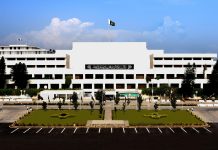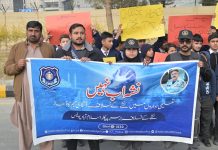By Ali Imran
ISLAMABAD: Parliamentary Secretary for Climate Change, Rana Ahmad Atiq Anwar on Wednesday said the government has launched several initiatives aimed at ensuring equitable access to climate-resilient infrastructure, healthcare, and clean water for children in vulnerable communities.
Speaking on the floor of National Assembly during Question Hour session, he said the government has taken these steps while recognizing the severe impacts of climate change on children, particularly in the face of extreme weather events such as floods, droughts, and heat waves. Sharing the details of key initiatives for Climate-Resilient Development, he said one of the major steps taken by the government is the Water and Sanitation Extension Program (WASEP), implemented by the Aga Khan Planning and Building Service, Pakistan.
Since its launch in 1997, WASEP has provided clean drinking water and improved sanitation facilities to disadvantaged communities, benefiting over 165,000 people, Rana said adding that this initiative has significantly reduced waterborne diseases, particularly among children, improving their overall health and well-being.
Similarly, in collaboration with Save the Children, the government has been constructing climate-resilient schools designed to withstand extreme weather conditions. These schools, particularly in flood-prone areas of Sindh, have been built to endure floods and heatwaves, ensuring a safe learning environment for over 400 students, he informed the lower house.
Moreover, Parliamentary Secretary said that in order to address the increasing health risks caused by climate change, including the rise of drug-resistant diseases, the government has ramped up investments in healthcare. Mobile clinics have been deployed to remote areas, and hospital capacities have been expanded to treat children and other individuals affected by climate-induced health crises.
He said that Pakistan has also secured a $20 billion funding agreement with the World Bank over the next 10 years.
This funding will be directed toward investments in renewable energy, education, and social sectors, with a particular focus on tackling child stunting, learning poverty, and climate change impacts on vulnerable communities, he added.






